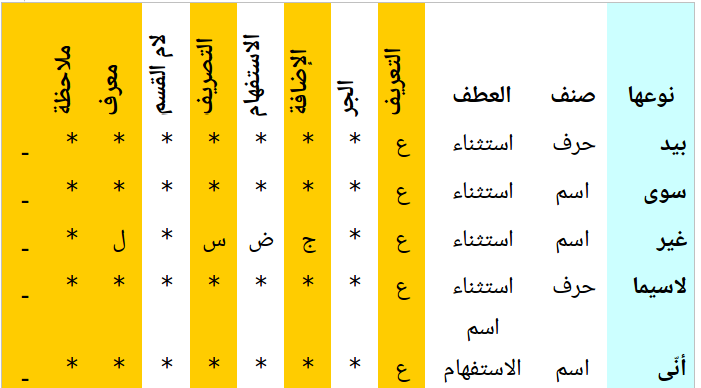Arabic Stop words

Developers: Taha Zerrouki: http://tahadz.com taha dot zerrouki at gmail dot com
| Features | value |
|---|---|
| Authors | Authors.md |
| Release | 0.9 |
| License | GPL |
| Tracker | linuxscout/arabicstopwords/Issues |
| Source | Github |
| Website | ArabicStopwords on SourceForge |
| Doc | package Documentation |
| Download | Python Library |
| Download | Data set CSV/SQL/Python |
| Feedbacks | Comments |
| Accounts | @Twitter) |
| Citation | T. Zerrouki, Arabic Stop Words |
Description
It's not easy to detemine the stop words, and in other hand, stop words differs according to the case, for this purpos, we propose a classified list which can be parametered by developper.
The Word list contains only words in its common forms, and we have generated all forms by a script.
It can used as library 'see section arabicstopwords library'
Files
- data-source/ : contains source data of stopwords
- data-source/classified/stopwords.ods: data in LibreOffice format with more valuble informations, and classified stopwords
- releases/latest: csv/sql/python formats:
- Classified stop words (lemmas)
- Inflected forms
-
Corpus based lists
-
docs: docs files
- scripts: scripts used to generate all forms, and file formats
Data
This project contains two parts: - Data part, which contains classified stopwords, all generated forms, in multiple format - CSV - Python - SQL / Sqlite - another list of most frequent in corpus like (Wikipedia and Tashkeela Corpus) - Python library for handling stopwords.
Data Structure
Two fromats of data are given: - classified words (lemma) with features to generate inflected froms - Generated forms from lemmas with adding affixes.

Minimal classified data .ODS/CSV file - 1st field : unvocalised word ( في) - 2nd field : type of the word: e.g. حرف - 3rd field : class of word : e.g. preposition
Affixation infomration in other fields:
- 4th field : AIN in Arabic , if word accept Conjunction 'العطف', '' else
- 5th field : TEH in Arabic , if word accept definate article 'ال التعريف', '' else
- 6th field : JEEM in Arabic , if word accept preposition article 'حروف الجر المتصلة', '' else
- 7th field : DAD in Arabic , if word accept IDAFA articles 'الضمائر المتصلة', '' else
- 7th field : SAD in Arabic , if word accept verb conjugation articles 'التصريف', '' else
- 8th field : LAM in Arabic , if word accept LAM QASAM articles 'لام القسم', '' else
- 8th field : MEEM in Arabic , if word has ALEF LAM as definition article 'معرف', '*' else
All forms data CSV file - 1st field : unvocalised word ( بأنك) - 2nd field : vocalised inflected word with : e.g. ف-ب-خمسين-ي - 3rd field: word type (super class): noun, verb, tool حرف - 4th field: word type (sub class): إنّ وأخواتها - 5th field: original or lemma: إن - 6th field: procletic : ب - 7th field: stem : أن - 8th field: encletic: ك - 9th field: tags: جر:مضاف
word vocalized type category original procletic stem encletic tags
بأنك بِأَنّكَ حرف إن و أخواتها أن ب- -ك جر:مضاف
بأنكما بِأَنّكُمَا حرف إن و أخواتها أن ب- -كما جر:مضاف
How to customize stop word list
- check the minimal form data file (stopwords.csv)
- comment by "#" all words which you don't need
- run
make
- catch the output of script in releases folder.
How to update data
- check if the word doesn't exist in the minimal form data file ( classified/stopwords.ods)
- add affixation information
- run
make
- catch the output of script in releases folder.
Arabic Stop words Library
Install
pip install arabicstopwords
Usage
- test if a word is stop
>>> import arabicstopwords.arabicstopwords as stp
>>> # test if a word is a stop
... stp.is_stop(u'ممكن')
False
>>> stp.is_stop(u'منكم')
True
- stem a stopword
>>> word = u"لعلهم"
>>> stp.stop_stem(word)
u'لعل'
- list all stop words
>>> stp.stopwords_list()
......
>>> len(stp.stopwords_list())
13629
>>> len(stp.classed_stopwords_list())
507
- give all forms of a stopword
>>> stp.stopword_forms(u"على")
....
>>> len(stp.stopword_forms(u"على"))
144
- get stopword as list of dictionaries
>>> from arabicstopwords.stopwords_lexicon import stopwords_lexicon
>>> lexicon = stopwords_lexicon()
>>> # test if a word is a stop
... lexicon.is_stop(u'ممكن')
False
>>> lexicon.is_stop(u'منكم')
True
>>> lexicon.get_features_dict(u'منكم')
[{'vocalized': 'منكم', 'procletic': '', 'tags': 'حرف;حرف جر;ضمير', 'stem': 'من', 'type': 'حرف', 'original': 'من', 'encletic': '-كم'}]
- get stopword as tuple
>>> from arabicstopwords.stopwords_lexicon import stopwords_lexicon
>>> lexicon = stopwords_lexicon()
>>> tuples = lexicon.get_stopwordtuples(u'منكم')
>>> tuples
[<stopwordtuple.stopwordTuple object at 0x7fd93b3d12b0>]
>>> for tup in tuples:
... print(tup)
...
{'vocalized': 'منكم', 'procletic': '', 'tags': 'حرف;حرف جر;ضمير', 'stem': 'من', 'type': 'حرف', 'original': 'من', 'encletic': '-كم'}
>>> >>> for tup in tuples:
... dir(tup)
...
['accept_conjuction', 'accept_conjugation', 'accept_definition', 'accept_inflection', 'accept_interrog', 'accept_preposition', 'accept_pronoun', 'accept_qasam', 'accept_tanwin', 'get_action', 'get_enclitic', 'get_feature', 'get_features_dict', 'get_lemma', 'get_need', 'get_object_type', 'get_procletic', 'get_stem', 'get_tags', 'get_vocalized', 'get_wordclass', 'get_wordtype', 'is_defined', 'stop_dict']
>>>
- get stopword by categories
>>> from arabicstopwords.stopwords_lexicon import stopwords_lexicon
>>> lexicon = stopwords_lexicon()
>>> lexicon.get_categories()
['حرف', 'ضمير', 'فعل', 'اسم', 'اسم فعل', 'حرف ابجدي']
>>> lexicon.get_by_category("اسم فعل", lemma=True, vocalized=True)
['آهاً', 'بَسّْ', 'بَسْ', 'حَايْ', 'صَهْ', 'صَهٍ', 'طَاقْ', 'طَقْ', 'عَدَسْ', 'كِخْ', 'نَخْ', 'هَجْ', 'وَا', 'وَا', 'وَاهاً', 'وَيْ', 'آمِينَ', 'آهٍ', 'أُفٍّ', 'أُفٍّ', 'أَمَامَكَ', 'أَوَّهْ', 'إِلَيْكَ', 'إِلَيْكُمْ', 'إِلَيْكُمَا', 'إِلَيْكُنَّ', 'إيهِ', 'بخٍ', 'بُطْآنَ', 'بَلْهَ', 'حَذَارِ', 'حَيَّ', 'دُونَكَ', 'رُوَيْدَكَ', 'سُرْعَانَ', 'شَتَّانَ', 'عَلَيْكَ', 'مَكَانَكَ', 'مَكَانَكِ', 'مَكَانَكُمْ', 'مَكَانَكُمَا', 'مَكَانَكُنَّ', 'مَهْ', 'هَا', 'هَاؤُمُ', 'هَاكَ', 'هَلُمَّ', 'هَيَّا', 'هِيتَ', 'هَيْهَاتَ', 'وَرَاءَكَ', 'وَرَاءَكِ', 'وُشْكَانَ', 'وَيْكَأَنَّ', 'وَرَاءَكُما', 'وَرَاءَكُمْ', 'وَرَاءَكُنَّ', 'بِئْسَمَا']
Citation
If you would cite it in academic work, can you use this citation
T. Zerrouki, Arabic Stop Words, https://github.com/linuxscout/arabicstopwords/, 2010
Another Citation:
Zerrouki, Taha. "Towards An Open Platform For Arabic Language Processing." (2020).
or in bibtex format
@misc{zerrouki2010arabicstopwords,
title={Arabic Stop Words},
author={Zerrouki, Taha},
url={https://github.com/linuxscout/arabicstopwords},
year={2010}
}
@thesis{zerrouki2020towards,
title={Towards An Open Platform For Arabic Language Processing},
author={Zerrouki, Taha},
year={2020}
}
